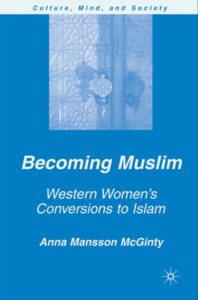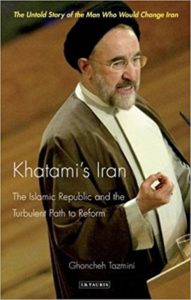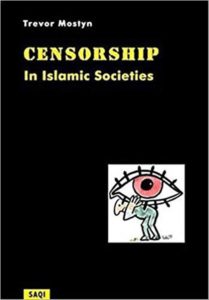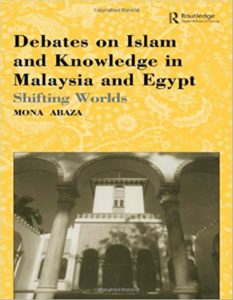
Becoming Muslim - Western Women’s Conversions to Islam
Anna Mansson McGinty
Palgrave Macmillan (2009)
Rs3,664
While Islam has become a controversial topic in the West, a growing number of Westerners find powerful meaning in Islam. Becoming Muslim is an ethnographic study based on in-depth interviews with Swedish and American women who have converted to Islam. Proceeding from the women’s life-stories, the author explores the appeal of Islam to some Western women and the personal meaning assigned to the religion. While conversion is often perceived as entailing a dramatic change in worldview, the women’s experiences point to an equally important continuity. Notably, the conversion is triggered by particular personal ideas and quests, and within Islam the women can further explore already salient thoughts. The work appeals to students in the fields of anthropology, religious studies, psychology, and women’s studies, interested in identity, conversion, and gender.
Becoming Muslim is essential reading for anyone interested in conversion processes, contemporary Islam, and the intricate dynamics of human change. Through in-depth interviews with nine remarkable women (six Swedish and three American), anthropologist Mansson McGinty takes us into the worlds of these diverse women as they share their fascinating, complex journeys to Islam. Given the troubled history of Christianity and Islam and the after effects of September 11, 2001, many stereotypes and hostilities distort our understanding of one another. In addition, seeing Muslim women wearing veils conjures images of submissive, denigrated women. Some are outraged and perplexed by the idea that any woman could voluntarily become a Muslim. If, however, one reads Mansson McGinty’s excellent book, one can gain a deeper understanding of the multifaceted, ongoing pilgrimage of how and why these women were and are becoming Muslim. Readers of this book will be impressed by Mansson McGinty’s sophisticated scholarship and her nuanced engagement with these Muslim women.
Anna Mansson McGinty received her PhD at Lund University, Sweden, in 2002. She is an assistant professor of Geography and Women’s Studies at University of Wisconsin-Milwaukee.

God: The Failed Hypothesis
Victor J. Stenger
Prometheus Books (2007)
Rs2,364
Throughout history, arguments for and against the existence of God have been largely confined to philosophy and theology, while science has sat on the sidelines. Despite the fact that science has revolutionized every aspect of human life and greatly clarified our understanding of the world, somehow the notion has arisen that it has nothing to say about the possibility of a supreme being, which much of humanity worships as the source of all reality. This physicist and author contends that, if God exists, some evidence for this existence should be detectable by scientific means, especially considering the central role that God is alleged to play in the operation of the universe and the lives of humans. Treating the traditional God concept, as conventionally presented in the Judeo-Christian and Islamic traditions, like any other scientific hypothesis, Stenger examines all of the claims made for God’s existence. He considers the latest Intelligent Design arguments as evidence of God’s influence in biology. He looks at human behavior for evidence of immaterial souls and the possible effects of prayer. He discusses the findings of physics and astronomy in weighing the suggestions that the universe is the work of a creator and that humans are God’s special creation. After evaluating all the scientific evidence, Stenger concludes that beyond a reasonable doubt the universe and life appear exactly as we might expect if there were no God.
Victor J. Stenger is adjunct professor of philosophy at the University of Colorado and emeritus professor of physics and astronomy at the University of Hawaii. He is the author of the New York Times bestseller God: The Failed Hypothesis, and many other books, including The Fallacy of Fine-Tuning, The New Atheism, Quantum Gods, The Unconscious Quantum, The Comprehensible Cosmos, Timeless Reality, Physics and Psychics and Has Science Found God?

Khatami’s Iran: The Islamic Republic and the Turbulent Path to Reform
Ghoncheh Tazmini
I.B Tauris (2013)
Rs9,619
All eyes are on Iran, and one man has emerged pivotal to the country’s future direction: Mohammad Khatami. Not only his politics but his entire persona stand in stark contrast to his political rival Mahmoud Ahmadinejad, whose four-year presidency has proved so fatefully controversial for Iran.
When Mohammed Khatami stormed to his 1997 election victory in a landslide result, the world waited anxiously for the reforms and radical changes that he would bring to the Iranian Presidency. By the end of his term in 2005, general disillusion had spread among his supporters.
But when in early 2009, Khatami again announced his candidacy for the Presidency, he was greeted with massive enthusiasm and support. The Ahmadinejad period of the previous four years had dramatically restored the fortunes of this mild-mannered, cerebral cleric who sought to bring Iran into the twenty-first century, end its international isolation, mend relations with the US, and take its place as the leading regional power.
But who is this enigmatic cleric, so little known in the West, whose grasp of Iran’s realities seems so much firmer than that of many of the secular figures around him? This book for the first time reveals the background, formation, and thinking of a man who may yet change the face of politics in the Middle East.
Ghoncheh Tazmini is an Iranian-born independent political analyst who has worked with research institutes in Europe and Iran. Educated at the University of British Columbia and the London School of Economics, she holds a PhD in International Relations from the University of Kent at Canterbury. She is Research Director at the Ravand Institute for Economic and International Studies.

Censorship in Islamic Societies
Trevor Mostyn
Saqi Books (2002)
Rs3,105
This concise history of Islamic censorship examines the turbulent question of freedom of expression in Islamic societies. The book ranges from the ancient Arabians, to Muhammad’s charter offering freedom of expression to Muslims, to modern history, when control of communication shifted to the secularists. Trevor Mostyn’s incisive book culminates in an analysis of the current political direction of censorship, and the control of freedom of expression.
This concise history of Islamic censorship examines the turbulent question of freedom of expression in Islamic societies. The book ranges from the ancient Arabians, to Muhammad’s charter offering freedom of expression to Muslims, to modern history, when control of communication shifted to the secularists. Trevor Mostyn’s incisive book culminates in an analysis of the current political direction of censorship, and the control of freedom of expression.
Trevor Mostyn taught at Algiers University before joining the Middle East Economic Digest as a journalist in London. He has published six books on the Middle East and edited the Cambridge Encyclopaedia of the Middle East and North Africa.

Debates on Islam and Knowledge in Malaysia and Egypt Shifting Worlds
Mona Abaza
Rs9,161, Routledge-Curzon (2002)
Written by Mona Abaza, Debates on Islam and Knowledge in Malaysia and Egypt: Shifting Worlds is an important book which tries to link together the intellectual, ideological, and political developments in two Muslim-majority countries—Egypt and Malaysia—over the past three decades and to explore the hidden undercurrents of intellectual-political life in both countries. The work focuses on the development of Islamic intellectual and academic thought that has taken on a life of its own and followed a number of different trajectories following the landmark international conference on Muslim education that was held in Mecca in 1977, and Prof. Ismail Raj Faruqi’s clarion call for Muslim scholars, Ulama, and intellectuals to take up the task of reconstructing the order of knowledge on terms that were fundamentally Islamic, more culturally authentic, and directly relevant to the needs of contemporary Muslims the world over.
At the root of the project Abaza identifies the crisis of confidence and intellectual dependency that had taken root in the collective Muslim psyche and the reaction of a whole generation of post-colonial Muslim intellectuals and political elites to the enduring dominance and hegemony of the West over the rest. She locates the Islamization of knowledge project within the historical parameters of the post-colonial era, tracing its linkages and similarities with other Third-Worldist trends that were en vogue at the time, including the Africanist “negritude” movement, the emergence of subaltern studies in the Indian subcontinent, the calls for cultural particularism in the West, and the (much later) development of the “Asian values” school of thought in Southeast and East Asia.
What unites these intellectual movements was and is the growing awareness that “knowledge” is not neutral, objective, nor as universal as some of its Western proponents claim it to be, but that what now passes as universal knowledge based on immutable scientific and empirical premises has itself been put through the sieve and prism of the occidental eye which invariably frames the world from its own distinct cultural, historical, and secular-universal perspective. Seen thus the Islamization of knowledge project comes across as the Muslim world’s response to the intellectual and epistemological hegemony of the West, by coming up with an alternative order of knowledge and power that is nonetheless caught in an oppositional dialectics with the Other.
Working on such familiar Foucauldian premises, Abaza attempts to explain as well as deconstruct the workings of the Islamization of knowledge project, attempting to unearth its internal mechanisms as well as some of its more obvious contradictions and blind spots. Debates on Islam and Knowledge thus reads as a sustained attempt at an archaeology and deconstruction of a vast intellectual program that was itself meant to be an archaeology of sorts: Abaza offers us a book that is basically a history of ideas, and one that tries to identify the evolution of this body of ideas within the wider socio-cultural and political currents of the societies that became the hosts and benefactors of that project.
Mona Abaza is an associate professor at the American University in Cairo.

